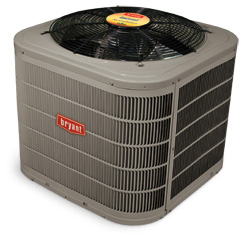
Many homeowners can help the environment and save significantly on energy bills by installing a Heat Pump.
A Heat Pump replaces conventional air conditioning and can also supply heat in the winter. If you are interested in finding out more about Heat Pumps, you can read the information below and also contact [sc:company]. We both install and repair Heat Pumps.
Frequently Asked Questions
Will a Heat Pump save energy in my home?
Heat Pumps offer the most significant energy savings where:
- Natural gas is not available as a fuel
- Winter temperatures are mild
- The home is well-insulated
If natural gas is available to you, we will probably recommend a conventional air conditioning and furnace system. But if your home is served by fuel-oil or electricity, a Heat Pump may be a major energy-saver.
Will I also need a conventional central heater if I install a Heat Pump?
Yes, though your primary source of heat will be the Heat Pump. When temperatures dip towards freezing, a conventional electric heater will be needed to supplement the Heat Pump. In summer, however, the Heat Pump will be able to supply all of your cooling.
How does a Heat Pump work?
Just like conventional air conditioning, in the summer a Heat Pump draws heat from indoors and rejects it to the outdoors. In winter, the direction of the air flow in a Heat Pump can be reversed. In winter, the Heat Pump draws heat from the outdoors and brings it into your home.
It may seem that in winter there’s not much outdoor heat to draw from. But at temperatures above the 30°- 45° F range, Heat Pumps are very efficient at squeezing heat from outdoor air. In this way, Heat Pumps both cool your home and heat it. And in many cases, they do so more efficiently than a conventional heating and air system.
